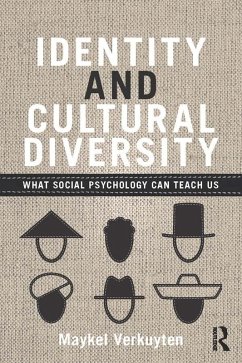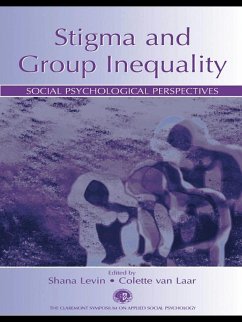
Handbook of Prejudice, Stereotyping, and Discrimination (eBook, PDF)
Versandkostenfrei!
Sofort per Download lieferbar
112,95 €
inkl. MwSt.
Weitere Ausgaben:

PAYBACK Punkte
56 °P sammeln!
This new edition of this bestselling handbook offers a comprehensive and scholarly overview of the latest research on prejudice, stereotyping, and discrimination.Now in its third edition, the book provides a full update of its highly successful predecessor and features new material on topics such as antisemitism, mental illness stigma, sexual and gender identity prejudice, anti-fat prejudice, politics and prejudice, ableism, evolutionary theory and prejudice, and anti-immigration prejudice. The book is divided into four main parts that consider the origins of prejudice; cognitive, affective, a...
This new edition of this bestselling handbook offers a comprehensive and scholarly overview of the latest research on prejudice, stereotyping, and discrimination.
Now in its third edition, the book provides a full update of its highly successful predecessor and features new material on topics such as antisemitism, mental illness stigma, sexual and gender identity prejudice, anti-fat prejudice, politics and prejudice, ableism, evolutionary theory and prejudice, and anti-immigration prejudice. The book is divided into four main parts that consider the origins of prejudice; cognitive, affective, and motivational processes in prejudice; targets of prejudice and reducing prejudice. The volume is written by eminent researchers who explore topics by presenting an overview of current and cutting-edge research and, where appropriate, developing new theory, models, or scales.
Handbook of Prejudice, Stereotyping, and Discrimination is an essential text for graduate students, instructors and researchers in social and personality psychology. It is also an invaluable reference for academics and professionals in sociology, communication studies and the social sciences, as well as government workers and policymakers.
Now in its third edition, the book provides a full update of its highly successful predecessor and features new material on topics such as antisemitism, mental illness stigma, sexual and gender identity prejudice, anti-fat prejudice, politics and prejudice, ableism, evolutionary theory and prejudice, and anti-immigration prejudice. The book is divided into four main parts that consider the origins of prejudice; cognitive, affective, and motivational processes in prejudice; targets of prejudice and reducing prejudice. The volume is written by eminent researchers who explore topics by presenting an overview of current and cutting-edge research and, where appropriate, developing new theory, models, or scales.
Handbook of Prejudice, Stereotyping, and Discrimination is an essential text for graduate students, instructors and researchers in social and personality psychology. It is also an invaluable reference for academics and professionals in sociology, communication studies and the social sciences, as well as government workers and policymakers.
Dieser Download kann aus rechtlichen Gründen nur mit Rechnungsadresse in A, B, BG, CY, CZ, D, DK, EW, E, FIN, F, GR, HR, H, IRL, I, LT, L, LR, M, NL, PL, P, R, S, SLO, SK ausgeliefert werden.













